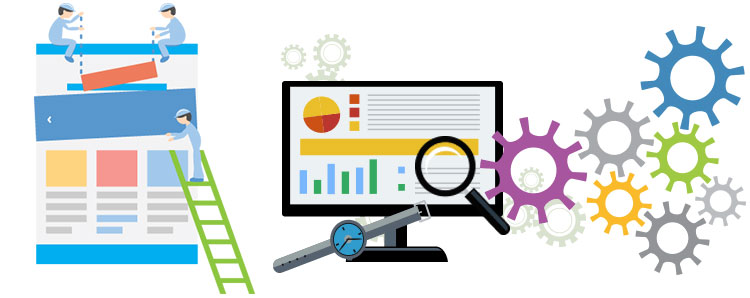Before a new car rolls out of the factory, years are spent concepting, engineering, prototyping, and perfecting the design and Website Maintenance. An orderly flurry of arms — human and robot — bring the design to fruition as parts come together on the assembly line.
When that marvel of engineering is sitting in your driveway, there’s nothing left to do but enjoy it. And watch, over the next few years, as every component steadily deteriorates, deprecates, and ultimately fails. And then you’ll have to walk everywhere. Alone. In the rain.
Of course, that’s just a cautionary tale. And one easily avoided if you take that car in for seasonal maintenance, keep its fluids topped up, take care of the tires… and do a dozen other incredibly important things your car needs, to keep it running.

“Websites are a lot like cars that way”
After being designed, built, and delivered, your new website needs maintenance to keep it secure and up-to-date. A lot of things can go wrong if your website is neglected.
- Content can become out-of-date, misleading potential clients and other stakeholders.
- The latest web browser update might change the way your website displays — or prevent it from being displayed at all — preventing customers from contacting you.
- Key features like lead forms and shopping carts can malfunction, resulting in lost business.
- New exploits can result in your website being hacked and taken down.
- Hackers could steal client data from your website, harming them and the reputation of your business.
A website maintenance plan ensures that your website is working properly, represents your business well, and is processing leads and sales properly.
Your Plan Should Include:
Security Updates
- Keep your website platform and server patched with the latest security updates. For websites we host, we monitor hacking efforts and typically see dozens of hacking attempts every day using known vulnerabilities.
- CMS (eg. WordPress, Drupal, Sitecore) and e-commerce systems (eg. Magento, WooCommerce, OpenCart) have bugs and vulnerabilities that need to be patched regularly to keep them safe from hackers.
- Check with your web hosting company to ensure that they regularly patch their servers. If you run your own server, you can install patches yourself.
Key Functionality Tests
- Regularly test key functionality like lead forms, purchase funnels, and site search to ensure that they’re working as intended.
- Features are often broken by website hosting companies as they apply patches that keep their servers up-to-date.
- We’ve seen cases where key components of a website have been broken for a long time without anyone noticing. The result can be frustrated customers and loss of business.
Analytics Test
- Ensure that your web developer tools are tracking properly, so you know who is coming to your site and which of your marketing tactics are bringing them there.
- Without analytics, your marketers are flying blind and missing valuable direction and insight.
New Browser Test
- Test new browsers as they’re released, to ensure that your website is still working as intended.
- New versions of existing browsers (eg. Chrome, Safari, Internet Explorer) are released regularly, often aren’t 100% backwards compatible, and can include changes that break existing website features.
Content Review
- Outdated content can frustrate users and have a negative impact on your search engine rankings.
- Google and other search engines prioritize sites that are regularly updated.
- In addition to updating content, be sure to keep your page titles and meta descriptions current.
- Check for broken links pointing to pages that have moved or are no longer there.
An Ideal Website Maintenance Schedule
For websites that Nerder maintains, we do the following maintenance at weekly, monthly, and quarterly intervals:
Weekly Checks
- Backups are being made daily
- CMS and e-commerce system security patches are up-to-date
- Web server patches are up-to-date
- Everything works in the latest version of all browsers
- Lead forms and email forms are working
- Site search is working
- Shopping cart and check-out processes are working
- Key functionality is working as intended
- Google’s Webmaster Tools show no site indexing problems
Monthly Checks
- No 404 errors
- No broken links
- Content on main landing pages is current
- Traffic, events, and goals are being tracked by website analytics
Quarterly Checks
- All pages have up-to-date content
- Meta title and description tags are up-to-date
- User experience reviewed for areas of improvement
- Domain name renewed if expiring in the next 12 months
Stay on top of maintenance (or hire someone to do it for you) and you’ll keep your websites running like new — long after that new website smell has faded.

